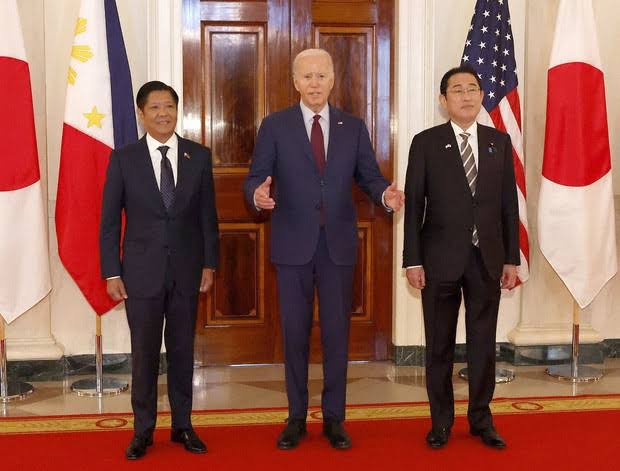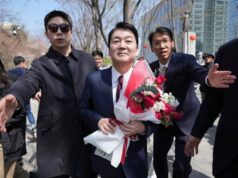Japan must tread carefully amid China tensions

As Japan seeks to boost defence cooperation with the Philippines amid a Manila-Beijing territorial row that has escalated tensions in the West Philippines Sea, experts are counselling Tokyo to take a cautious approach as the region balances the competing agendas of China and the United States.
The recent intensification of hostility between the Philippines and China in the disputed waters was highlighted at this year’s Asia Security Summit, where Philippine President Ferdinand Marcos Jr. rapped Beijing for its “illegal, coercive actions” and argued strongly for the protection of the rules-based order in his speech.
Japan has joined U.S.-led efforts to bolster defence ties with the Philippines, in a move seen as pushing back against China’s ambitions in the Indo-Pacific region.
Beijing claims almost the entire area of the resource-rich West Philippines / South China Sea / Natuna Sea and has ongoing territorial rows with fellow littoral states, including Vietnam and Malaysia.
Manila asserts its sovereign rights in the West Philippines Sea, and it started to call parts of the sea within the country’s exclusive economic zone “the West Philippine Sea” in 2012.
Tokyo’s pursuit of greater security cooperation with Manila and other regional countries is welcome as Southeast Asian nations need partner diversity, not just aligning with either the United States or China, said Evan Laksmana, senior fellow at the International Institute for Strategic Studies, the host of the Singapore gathering.
Tokyo has taken part in joint maritime exercises with the Philippines, the United States and Australia in the West Philippines Sea. In April, Prime Minister Fumio Kishida held the first-ever trilateral summit with Marcos and U.S. President Joe Biden in Washington.
In July, Japan and the Philippines will likely sign an agreement allowing their defence forces to train in each other’s territories during a meeting involving the two nations’ foreign and defence ministers, according to Philippine Defence Secretary Gilberto Teodoro.
In addition to Japan, other alternative security partners for the region include South Korea, Australia, France and Britain.
But Japan is unique because it has a “strategic capital” built around pragmatic cooperation and economic engagement over decades in Southeast Asia, the International Institute for Strategic Studies’ Laksmana pointed out.
He warned some of that strategic capital can be eroded if Japan is “seen as just an extension of the United States” and “overtly playing geopolitical cards” when the region is very sensitive about polarizing moves.
“Japan has a great potential because of its long strategic capital, but if it does not play its cards right, I think it could be seen as Japan engaging in security cooperation with Southeast Asian countries as part of its competition against China,” Laksmana said.
“If that is perceived as a problem, then I think it may not be successful,” he added.
China has huge economic clout in the region and the 10-member Association of Southeast Asian Nations maintains the principle of neutrality toward major powers, refraining from taking sides amid the intensifying rivalry between Beijing and Washington.
Some ASEAN countries like Cambodia and Laos, this year’s chair, are seen as pro-Beijing. Vietnam, Malaysia and Brunei also have territorial disputes with China, but tensions are less intense compared with Manila’s.
Marcos’ controversial predecessor Rodrigo Duterte appeased China and did not take a clear stance in opposition to its territorial advances in the West Philippines Sea.
ASEAN and China have long been drafting a code of conduct to prevent confrontations in the South China Sea, but negotiations have stalled due partly to distrust generated by Beijing’s harassment of other claimant states, said Tomotaka Shoji, director of the Regional Studies Department at the National Institute for Defence Studies.
Shoji said the Philippines under Marcos’s leadership has sought alternative measures to ASEAN’s approach amid a lack of progress on the code of conduct negotiations, namely aligning with the United States and its allies to keep China in check.
Saya Kiba, associate professor at Kobe City University of Foreign Studies, indicated the Marcos government’s “transparency initiative” to expose China’s harassment toward Philippine vessels in the West Philippines Sea has succeeded in gaining more international support for Manila’s position.
The initiative launched last year allows journalists to board Philippine vessels and report pictures and videos of incidents.
Since the policy started, more than a dozen European countries have expressed their support, despite their geographical distance, for a 2016 ruling of the Permanent Court of Arbitration in The Hague that invalidated China’s sweeping claims in the West Philippines Sea, she said.
Beijing has rejected the court’s decision and continued its military buildup in the area.
Kiba said Japan can help the Philippines enhance its maritime security capabilities through the provision of additional patrol ships and surveillance technology. It can also back Manila’s transparency strategy to gain more support for its sovereignty in line with the 2016 ruling.
However, she said Manila “does not want to be seen as clinging to the United States” in the same way as other ASEAN member states that do not take sides with Beijing or Washington are viewed.
In his keynote speech at the conference known as the Shangri-La Dialogue, Marcos said both China and the United States are important in the region, referring to Beijing’s “determining influence” over its economic evolution and “the stabilizing presence of America” that is “crucial to regional peace.”
Although moves by the United States and Japan to deepen security cooperation with the Philippines have triggered speculation that they may seek Manila’s support in the event of a Chinese invasion of Taiwan, the Southeast Asian country has refrained from making mention of its stance in such a contingency, she said.
“The Philippines upholds the one-China principle and the general public does not support their country being dragged” into a Taiwan emergency, Kiba said.
Marcos said the Filipino people have “a long history of fraternal bonds with the people on both sides of the Taiwan Strait” and urged “all parties to exercise restraint on the issue.”
Shoji also said when Japan joins efforts to counter China’s maritime assertiveness in the West Philippines Sea, it should be careful not to “give China a reason to take a bold action” in the East China Sea, where Beijing regularly sends vessels near the Tokyo-controlled Senkaku Islands to press its territorial claim.
For instance, Beijing reportedly regarded Tokyo’s participation in the U.S. freedom of navigation operations in the West Philippines Sea as a “red line” that must not be crossed, he said. Japan has not joined those operations to avoid friction with neighbouring countries.
“Japan should pay attention to the situations both in the West Philippines Sea and East China seas to strike a balance and craft its strategies,” Shoji said.




